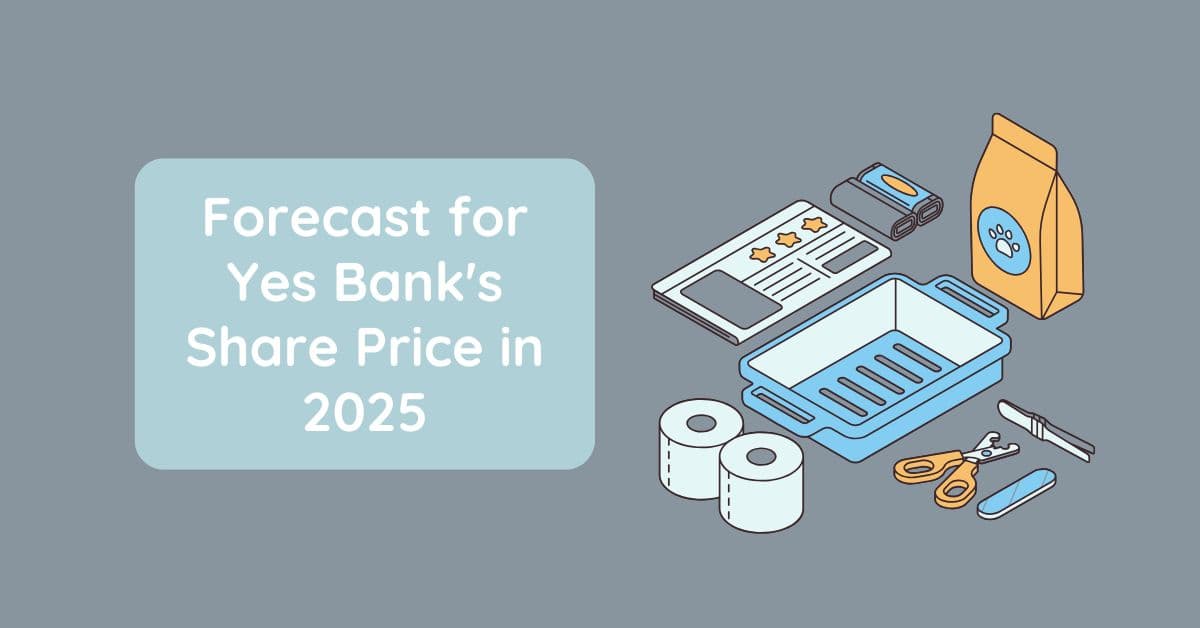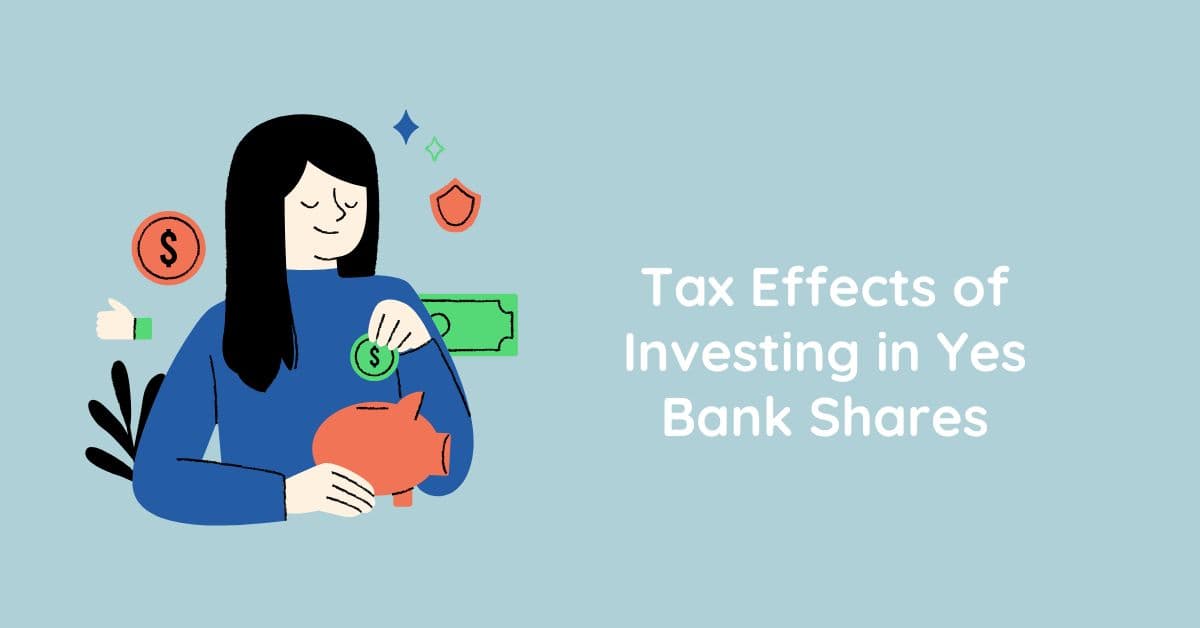Yes Bank Share Price : In 2025, investors will be interested in Yes Bank, a well-known private sector bank in India, because of its remarkable comeback from the financial crisis of 2020. Yes Bank (NSE: YESBANK) is a company to keep an eye on for individuals creating a strong budgeting plan because of its share price, which was at ₹25.60 on June 4, 2025, and analyst forecasts that suggest substantial growth potential. Yes Bank provides chances for wealth generation, supported by strategic investments from major international companies like Sumitomo Mitsui Banking Corporation (SMBC) and enhanced financial measures. You can confidently navigate India’s dynamic banking industry with the aid of this article, that examines Yes Bank’s share price prognosis, tax implications, and useful advice for incorporating this stock into your financial strategy.
Forecast for Yes Bank’s Share Price in 2025
Yes Bank was founded in 2004 by Ashok Kapur and Rana Kapoor. Through strategic restructuring and a rescue led by the State Bank of India, the bank has surmounted major obstacles, including a severe non-performing asset (NPA) issue. The bank has steadily recovered from its 2020 low of ₹10, and as of March 2025, its market capitalisation is ₹79,749 crore, with its stock price at ₹25.60. Recent events have further bolstered investor trust, such as SMBC’s acquisition of a 20% share for ₹13,482 crore in May 2025. The following summarises Yes Bank’s 2025 share price goals according to analyst projections:

- Minimum Target: Taking into consideration possible market volatility and regulatory uncertainty, the minimum target is ₹24.20.
- Maximum Target: Driven by increased profitability, digital banking efforts, and the expansion of retail loans, the maximum target is ₹55.
- Average Financials: Analyst optimism from companies like ICICI Securities and HDFC Securities, which point to solid fundamentals, supports the average target of ₹30 to ₹35.
Current Financial Information: With total revenue of ₹9,437.85 crore in Q4 of FY 2024–25, Yes Bank posted a net profit of ₹744.53 crore, a 59.33% year-over-year growth. By the end of FY 2025, the bank’s capital adequacy ratio is expected to reach 11%, indicating financial stability, and its gross non-performing asset ratio has improved to 1.7%.
Important Growth Factors for 2025
Yes Bank is a crucial part of your budgeting approach because of a number of variables that position it for development in 2025:
- Better Asset Quality: A strong recovery is demonstrated by the decline in non-performing assets (NPAs) from 15% in 2020 to 1.7% in 2024 and the increase in profits per share (EPS) from ₹0.95 in FY 2023 to ₹1.25 in FY 2024.
- Digital Banking Push: Investing in fintech partnerships, mobile banking applications, and AI-driven services improves operational efficiency and client acquisition.
- Strategic Alliances: SMBC, Advent International, and Carlyle Group investments assist the growth of the loan portfolio by contributing funds and credibility.
- Focus on Retail and MSME: Revenue diversification is fuelled by a 13% annual rise in deposits and more lending to the retail and MSME sectors.
- Economic Support: The RBI’s accommodative monetary policies and India’s anticipated 6–7% GDP growth in 2025 increase demand for loans and banks profitability.
Note: Analyst projections and market circumstances as of June 4, 2025, are the basis for share price targets. A financial counsellor should always be consulted before making an investment.
Tax Effects of Investing in Yes Bank Shares
Understanding the tax ramifications under India’s Income Tax Act, especially under the previous tax system that provided investors with advantageous deductions, is necessary when incorporating Yes Bank shares into your budgeting plan. Here is a thorough examination of the main tax factors:

1. Tax on Capital Gains
Earnings from the sale of Yes, depending on the holding term, capital gains tax is applicable to bank shares.
- Short-Term Capital Gains (STCG): Section 111A taxes gains at 15% (plus surcharge and cess) if shares are sold within a year. A gain of ₹2,000, taxed at ₹300, can be obtained, for instance, by purchasing 200 shares for ₹25 and selling them at ₹35 within a year.
- Long-Term Capital Gains (LTCG): Gains above ₹1.25 lakh in a fiscal year are subject to 12.5% taxation under Section 112A (up from 10% in Budget 2024) if held for more than 12 months. A gain of ₹5,000 is obtained by selling 200 shares that were purchased at ₹25 and sold at ₹50 after 18 months; if the total LTCG above ₹1.25 lakh, the excess is subject to 12.5% tax.
Hack: To take advantage of the ₹1.25 lakh LTCG exemption and reduced tax rates, hold Yes Bank shares for more than a year. This will help you achieve your long-term financial objectives.
2. Taxation of Dividends
The most recent dividend of ₹2 was paid out in June 2019, and Yes Bank’s current dividend yield is 2.12%. Dividends are taxed at your slab rate under “Income from Other Sources” if they start up again in 2025. If the yearly dividend exceeds ₹5,000, 10% TDS is levied.
Hack: To compound returns and reduce tax obligations, reinvest dividends into Yes Bank stock or tax-saving options like ELSS.
3. Transaction Tax on Securities (STT)
When buying or selling Yes Bank shares on the NSE or BSE, a 0.1% STT is applied. For instance, the STT for purchasing 100 shares at ₹25 is ₹2.50. STT guarantees eligibility for STCG and LTCG tax advantages even if it is not deductible.
Hack: To ensure smooth tax reporting by the July 31, 2025, ITR deadline, track STT and capital gains using a demat account.
4. Strategies for Saving Taxes
Use these tax-saving techniques to maximise the rewards on your Yes Bank investments:
- Balance Capital Losses: To lower your tax obligation, use the losses from other assets to balance the profits from Yes Bank. While long-term losses only offset LTCG, short-term losses can negate both STCG and LTCG.
- Investments under Section 80C: To reduce your taxable income and free up money for Yes Bank shares, invest up to ₹1.5 lakh in ELSS, PPF, or NSC.
- Tax Harvesting: To take advantage of the LTCG exemption, sell shares with profits up to ₹1.25 lakh per year. Then, reinvest the proceeds to reset the cost basis.
- Old Tax Regime: To increase your disposable income for investments, choose the old tax regime if your deductions (such as 80C and 80D) total more than ₹2.5 lakh.
Hack: Make sure your budgeting plan optimises savings by comparing the old and new tax regimes using online tax calculators.
Including Shares of Yes Bank in Your Budgeting Process
Your 2025 budgeting plan can improve asset growth and risk management by using Yes Bank shares. Here is a detailed guidance for investors from India:

- Establish Financial Goals: Match Yes Bank investments to objectives such as diversifying your portfolio, retirement planning, or wealth growth. Long-term investors will find its anticipated increase to ₹30 to ₹55 in 2025 appealing.
- Set aside money for investments: Set aside 10–15% of your portfolio for banking equities, such as Yes Bank, and balance it out with bonds or fixed-income investments.
- Invest using SIPs: Invest modest sums (e.g., ₹1,000/month) in Yes Bank shares via platforms like as Groww, Upstox, or Zerodha, averaging out market swings.
- Track Financial Metrics: To evaluate success, track Yes Bank’s capital adequacy (11% by FY 2025), EPS (₹1.25 in FY 2024), and NPA ratio (1.7% in 2024) on a quarterly basis.
- Make a tax plan: Set aside money for the July 31, 2025, ITR filing deadline and budget for LTCG tax (12.5% on gains over ₹1.25 lakh) and any dividend taxes.
- Rebalance Portfolio: Depending on market conditions and individual financial requirements, review your assets once a year to modify your exposure to Yes Bank.
Trick: For balanced financial growth, set up a monthly budget that allocates 5–10% of income to Section 80C tax-saving investments to supplement your Yes Bank holdings.
Forecasts for the Share Price of Yes Bank from 2025 to 2030
The following table summarises Yes Bank’s share price goals according to analyst projections:
From 2025 to 2030, Yes Bank’s share price is expected to rise steadily due to strategic initiatives and better financial health. The share price is anticipated to fluctuate between ₹31 and ₹38 in 2025, indicating initiatives to increase deposit growth and decrease non-performing assets (NPAs). Forecasts indicate that it will increase to ₹39–₹47 by 2026, bolstered by the development of retail loans and digital banking. The goal for 2027 is between ₹49 and ₹59, with an emphasis on improved MSME loans and profitability. The share price may rise to ₹95–₹114 in 2030 due to strong earnings per share (EPS) growth and advantageous economic conditions. These projections show that Yes Bank is on the right track, emphasising its initiatives to improve financial stability and broaden its offerings.
Source: Analyst projections from the Youth Council of India, Trademint, and Exla Resources.
Considerations for Risks
Although Yes Bank has a lot of room to develop, investors should be mindful of these risks:
- Regulatory Oversight: Operations may be impacted by the RBI’s ongoing monitoring as a result of previous financial problems.
- Market Volatility: Share prices may be impacted by banking sector difficulties or economic slowdowns.
- Risks to Asset Quality: An increase in non-performing assets (NPAs) may impede profitability and affect stock performance.
- Competition: There are risks from fintech companies and well-known businesses like HDFC Bank and ICICI Bank.
Hack: To shield your money from unexpected market declines, use stop-loss orders on trading platforms.
Frequently Asked Questions (FAQ)
What is the target share price for Yes Bank in 2025?
Analysts predict that better financials and strategic investments will generate a range of ₹24.20 to ₹55, with an average goal of ₹30 to ₹35.
What is the tax treatment of capital gains on shares of Yes Bank?
Under the previous tax system, long-term profits (held over 12 months) over ₹1.25 lakh were subject to 12.5% tax, while short-term gains (kept under 12 months) were subject to 15% tax.
Are dividends paid by Yes Bank?
Although the bank’s current dividend yield is 2.12%, since 2019, dividend payments have been erratic. Dividends are taxed at slab rates if they are resumed, and if they exceed ₹5,000, 10% TDS is applied.
How may owning shares of Yes Bank improve my approach to budgeting?
To maximise gains, allocate 10–15% of your portfolio to Yes Bank, invest through SIPs, keep an eye on important indicators like EPS and NPAs, and budget for LTCG taxes.
What is the FY 2024–2025 ITR filing deadline?
Individuals must do so by July 31, 2025, and those who need an audit must do so by October 31, 2025. To avoid fines, correctly report capital gains.
Conclusion
With a 2025 goal range of ₹24.20 to ₹55 and a current share price of ₹25.60, Yes Bank presents a substantial opportunity for investors wishing to improve their budgeting approach in India. Yes Bank is a tempting addition to a diversified portfolio because of its excellent recovery, which has been fuelled by fewer non-performing assets (NPAs), smart investments like SMBC’s share, and emphasis on digital and retail banking. You may optimise profits while lowering obligations by comprehending the tax ramifications, including capital gains, dividends, and STT, and using tax-saving techniques such tax harvesting and Section 80C investments. To maintain compliance and accumulate wealth with Yes Bank in 2025 and beyond, begin making smart investments, keep an eye on financial indicators, and submit your ITR by July 31, 2025.
Disclaimer: This article is intended for informative purposes only and does not represent financial or tax advice. A licensed tax expert or financial planner should be consulted before making any investment decisions.
Tesla Share Price in India Up Again: Time to Rethink Your Monthly Budget!
BSE Bonus Shares: Budget Your Portfolio Before It’s Too Late!
ITR Filing 2025 Deadline Near – Master Budgeting Before It’s Late!

